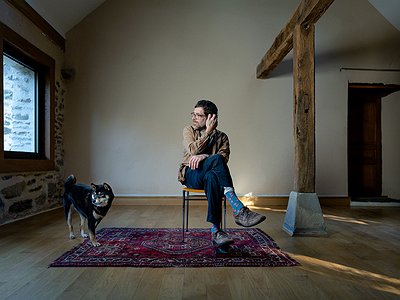Part 2
Can you talk about how your decision process works in a live setting?
I have found that a light-hearted fidelity to surrealist tendencies in thought have brought about the most pleasant experiences in a live setting. What does that mean? Well, it involves trying to remain critical and alert without judgment. Aware without intention.
I very much enjoy sleeping before a performance as this allows me a more direct access to this state. I wish not to bring energy to the music (impossible) but allow or open up a space where the internal energies’ logic (or what have you) of the music can better articulate themselves with less hinderances coming from the human mind.
That said, the decision process in a live setting is one with many different temporalities. There is what may seem like the present, right there, linked very specifically to what I am hearing and what I wish to hear (big problem) and then there is all of the time that has passed - time spent playing, listening, talking with friends, thinking about music while doing other things – that gives one a ground (or practice) for the present live setting. All of these times are illusory, to say that one keeps them close and may be able to rely on them to get out or into a jam (no pun intended, really) but that one may take some pleasure in taking them very lightly, to be open towards something you do not yet know, and may never know, to encounter time and how one passes the time with a healthy dose of lighthearted care and patience.
The concerts that have something special about them for me seem to pass by despite myself rather than because of any smart decisions I have made. Do we know when we are deciding? How?
How do you see the relationship between sound, space and performance and what are some of your strategies and approaches of working with them?
Ok, I will try to be more succinct with this question. Things are starting to roll out of control over here.
Let’s say that the space is first. As you see it before you hear it (most often). Perhaps we begin to imagine what could happen there given the materials you have come with.
The space has sound.
No, that’s not right, or not exactly.
The space sounds.
A soundcheck can be an incredibly intimate moment for various reasons. One, we hear what happens when your music encounters the space.
A lot of information there. And since I often perform with reinforcement, like a public address system, it is also an encounter with the sound engineer. I love sound engineers and almost always have a great time with them. Most often, it is a space they know well, even if that knowledge can be a hinderance.
So, I don’t say too much.
I talk about some frequencies that are often problematic, where I would like the monitors (usually as far away from my face as possible). And I try to leave as much up to them as possible, often, they get what needs to happen.
This is all to say that there are human beings in this performance space.
Oh boy, this is starting to roll out of control again. I’ll try and reign it in for the next question. I think I took this question too lightly.
How is playing live in front of an audience and in the studio connected? What do you achieve and draw from each experience personally?
Playing in front of an audience one receives a very condensed amount of information, often away from home which has its effects as well. There are a lot of factors that bleed into that condensed amount of information that have very little to do with the music or the concert itself. Therefore the learning that one gains from the live setting is also quite condensed.
When we are in front of an audience, we let go of what we have gained from playing at home and in the studio. Well, we let go of it and keep it close, take what we need from it (the way out of problems, the way into problems) and all of the time that we spend reflecting upon the music we have made in our studios. I am not sure it is so for everyone, but for me it is more important to put emphasis on letting go. Hell, that stuff will always be there, so there is no use sticking to it like glue. The music can change and remain itself.
This happens on a visceral level when one is performing with an audience. We are bringing this heap of sound and thought and sharing it with folks who have decided to come and hear you play. Lots of generosity there! How does the heap that was formed in a more hermetic practice (studio) spill into the public space?
That said, the studio is also a public space, albeit a hypothetical one. We can not completely shut the world out when we enter the studio. So, again I find myself thinking about the space in-between the studio and the stage and how one can inform the other and how both have their illusions.
I very much enjoy ping-ponging between the two and feeling each spill over to the other.
Can you talk about a breakthrough work, event or performance in your career? Why does it feel special to you? When, why and how did you start working on it, what were some of the motivations and ideas behind it?
I am not sure it is a breakthrough work or not, but I did have a breakthrough regarding improvising within a song structure. This was about 12 years ago and I was thinking of moving to France but I was still living in Toronto, the library where I had worked for 10 years had closed and I also found myself without a place to live. My father had an apartment near the lake but he was living in Florida, so I moved in there, not really knowing how things were going to turn out. Not the easiest of times but one full of sweetnesses (in hindsight).
I looked for a place to play guitar in the apartment but there was a lot of information on the walls, a lot of stuff I had grown up with and did not really want to look at. I went to the upstairs bathroom, brought in a chair and began to play. And I played there every day for 6 months. In that bathroom I would sing and improvise, in way that reminded me of how I sing in the shower, usually old jazz standards cause I like the melodies and know the words.
It was in that bathroom that I started to play my song "Dull Lights", singing and improvising but keeping the song rolling. And my voice changed, it got higher, more sinuous, a kind of confidence in singing pretty that I had resisted up until then. So it was there where I found the space in-between my voice and the guitar, and well, I keep going on with all that, more or less.
The motivations, the ideas, came after, after hearing it, after feeling the pleasure of those bathroom performances. It was a moment in time that I still use to motivate new material to appear.
In a way, improvisations remind us of the transitory nature of life. What, do you feel, can music express about life and death which words alone may not?
I agree! Improvisation is embedded in how we experience time, which, if it is anything, is certainly transitory. It is always moving, always only nomadic, even when it does not feel like it easy. The good news is that life does not much care how we feel and there is a lot to learn there as I think it a good practice to care a little less about how we feel. We really do put a lot of stock in it as humans don’t we? Perhaps if we felt and accepted the improvisatory nature in and of our feelings we would loosen up a bit (ouph, not easy!).
I think listening to music is an amazing way to practice letting go, to slur the gap of living and dying. And this relates to improvising as listening is improvising. And it is there that I have learned the most about improvising. How to creatively and productively forget.
There is something incredibly psychedelic about forgetting. I can’t think of anything that speaks more to the present-tense than forgetting. Obviously there are different forms of forgetting. I am talking about forgetting our relationship with our illusions and how that relationship has formed other relationships with control. Forgetting can be wild, an hallucination. Forgetting can be an encounter with something completely and wildly unknown to us, the hole, the gap, the other, love.
I am not sure I know what music expresses. I don’t think I listen that way. I encounter it and I may feel (most certainly) things but I do not have the illusion that the music is making me feel those things. Best not to blame the music for your feelings! And this links up with improvising as a practice and speaks to a lot of the questions that have been asked here.
As an improvisor I practice productive forgetting - forgetting what I am hearing so that an unknown simultaneity can emerge despite myself, forgetting who I think that I am, forgetting what I think I know to be right and wrong, forgetting what I think is bad and good and all of the mountains of tastes I have developed over time. Forgetting time. Forgetting in time. I think that this requires a certain amount of fidelity to what matters to you. A kind of friendship.






